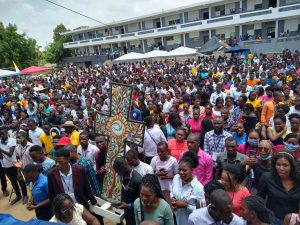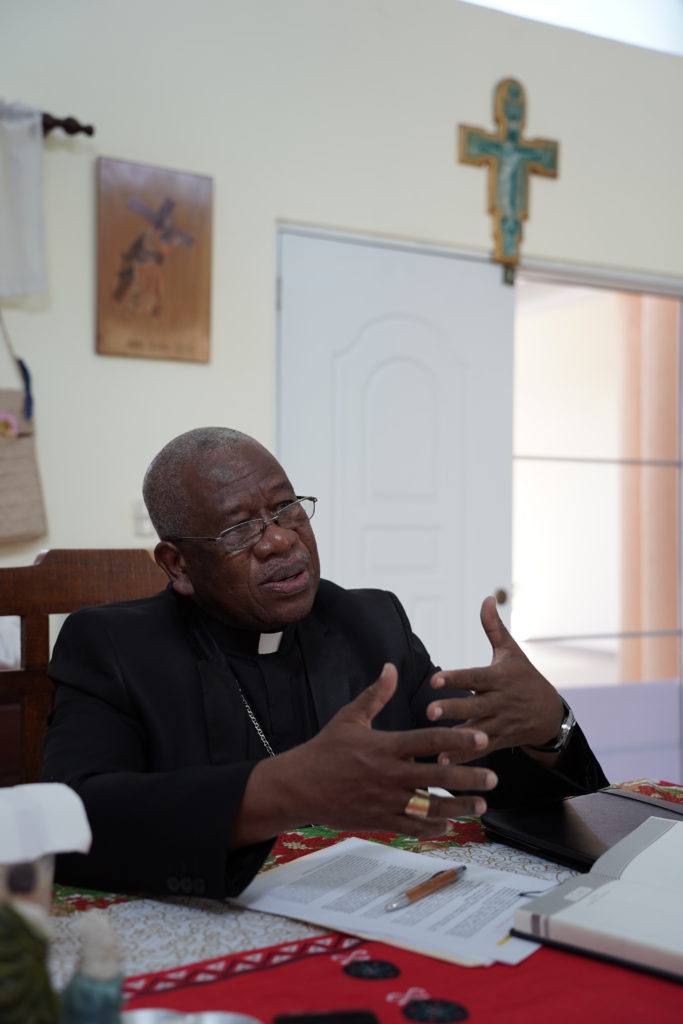Gang violence, forced migration and poverty continue to plague Haiti. The Bishop of Fort-Liberté, Quesnel Alphonse, speaks of looting by gangs, the growing influence of Islam and the trauma of a population that “feels completely lost”.
Haiti is experiencing a very difficult situation, marked by an increase of gang violence and a collapse of basic services. Would you say that the situation is getting worse?
Definitely, yes. If I had to pick a word to describe the situation, I’d say “suffocating”. It’s as if we are drowning. It’s about surviving. Things are getting increasingly difficult, and we don’t know what is going to happen. The fact is that people feel very lost. People are beyond poor; they are living in misery. This affects the whole country. Despair is at fever pitch, and when that is the case, anything can happen. This is a great shame, especially as we are about to begin the 2025 Jubilee, a moment we have been awaiting with hope.

What is the situation for the Haitians who move to the capital, Port-au-Prince, searching for a better life?
The people from the countryside, who cannot find solutions for their problems in the rural areas, have emigrated to Port-au-Prince, which is not equipped to host such a large population. Three million out of Haiti’s 12 million people are already living in the capital and its surroundings. This makes the misery all the greater. Besides the misery, we have seen a new phenomenon arising over the past three years, which is the gangs. In only one weekend in December, 184 people were brutally murdered in acts of violence. It’s terrible. It is very easy for armed gangs to organise in this overcrowded city.
What problems do these gangs cause?
The people from the countryside prefer to take their products to the capital, because they get better prices there, but the gangs make transport more difficult. That’s not the worst though. There is the repeated phenomenon of families who lose everything in a single night because the gangs arrive in their neighbourhoods and take all they have; they occupy their homes and force them to leave.

All this must affect families…
Yes, many families have been separated because of this. The father might be in the Dominican Republic, the mother in the Bahamas, and the children in the United States. Many Haitians are risking their lives at sea in search of a better life. However, they are not always welcomed in these countries, and they face discrimination. This affects the families, who end up being separated. The family, which is a fundamental pillar of society, is under threat, and this leads to social instability. Families are essential, and this situation has many effects, including on the vocations of the youth. We know of cases of Muslims who attract young people by giving them almost 100 dollars to convert. Though Islam is a minority religion in Haiti, its presence is increasing. It is sad to see these young people converting out of necessity, rather than conviction. Many also end up joining gangs for the same reason.
What do the gangs offer? How do they recruit people?
They also use money, especially in the very poor neighbourhoods. Yesterday I heard the witness of a young person who joined a gang. He said he was an orphan, that he didn’t have anybody, and because of that, his life was meaningless. The gangs give one a sense of belonging, and that is a danger. It’s not only a financial problem, it’s existential.
The gang phenomenon is a question of survival. In situations of extreme necessity, people are willing to anything, including killing. And to this we can add the problem of drugs. Under the influence of drugs, and in order to obtain them, many young people are willing to do anything. They lose their humanity, and they can go to extremes. The young people in the more troubled neighbourhoods are completely lost.
Are there any signs of hope in the country? What is the situation in your diocese for instance?
Yes, some things are improving. Some internally displaced people have begun to return, but the process is extremely traumatic. What they find when they return home is an emotional and psychological shock so great that it could destroy most people. It will take time, a long time, to be able to live again, to be able to return to a house that was looted and occupied. This shows how desperate the situation is. As I said, it is an existential crisis. It affects people totally. The identity of Haitian men and women is being questioned, and that requires urgent attention. And then we have other issues, such as blocked roads, which makes travelling to the capital difficult.
Could the 2025 Jubilee be an important moment for Haiti? How can the Church, with the aid of international benefactors, be a source of healing and rebuilding in a country marked by so much suffering?
As Pope Francis says, there are issues that invite us to commit and to offer signs of hope. In the Jubilee bull, the Pope addresses the issue of migrants, a reality which touches us deeply. We all need to reflect on this situation, not only in the Diocese of Fort-Liberté. This is a project which we should take very seriously next year. And the Holy Father also spoke of debt relief for poor countries… This Jubilee could be a great source of hope for Haiti.
I would like to take advantage of this opportunity to express my deep thanks to the benefactors of Aid to the Church in Need (ACN), whose continued generosity and support over these past years has been crucial to us at such a difficult moment in the life of our country.
In 2024, ACN supported the Church in Haiti with over 70 projects. In particular, the foundation supported diocesan radios, solar panel projects and the formation and living costs of priests, religious and catechists.


